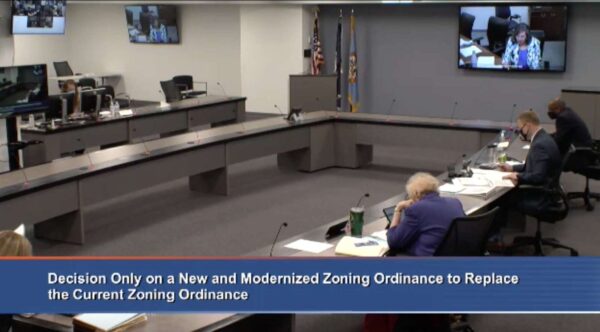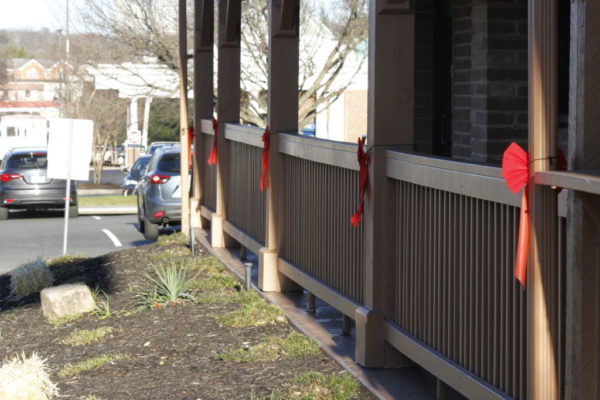The Fairfax County Board of Supervisors voted yesterday (Tuesday) to approve changes to the county’s zoning ordinance intended to make the codes easier to navigate and understand.
The 7-3 vote — with Supervisors Walter Alcorn, Daniel Storck, and Pat Herrity dissenting — serves as the culmination of a four-year Zoning Ordinance Modernization Project, or zMOD, that began in 2017 to update zoning laws codified in 1978.
Although the updates to the document were sweeping in scope, three proposed changes drew a great deal of public attention and comment. These included proposals to loosen restrictions on accessory living units and home-based businesses and revise size and height regulations for flags and flag poles.
“There are…very few issues receiving much attention,” Dranesville District Supervisor John Foust said. “I believe that demonstrates that, given everything that we’ve done, it was a fair and transparent process.”
Storck, who represents the Mount Vernon District, said he supports many aspects of the 614-page draft, but a few areas surrounding the accessory living units and the home-based businesses, including the permit process and enforcement, give him pause.
He worries that some of the proposed changes to require only administrative permits could lead to a lack of engagement and that enforcement, which he calls “the bread and butter of public confidence,” is not going to be swift or strong enough to stop zoning violations.
Approved changes to the regulations for accessory living units include allowing interior units with an administrative permit and removing the requirement that only those 55 and older or disabled people can live in them. However, the owner must live in the main home, can only operate one ALU in which up to two people can reside, and must provide a parking spot.
To operate a home-based business, people will need to get special exception permits to have customers visit between 8 a.m. and 9 p.m., unless they provide instruction to fewer than eight students a day and up to four at a time.
Acceptable businesses include retail — as long as sales and delivery occur online or offsite — as well as exercise classes, repair services for small household items, hair salons, and clothing tailors. People can also operate an office or as a music, photography, or art studio out of their home.
Residents can have up to three flags, and flag poles can be up to 25 feet tall when in front of a single-family home or up to 60 feet tall on other lots. Property owners can apply for a special permit to extend the height of a pole.
The board opted not to adopt any regulations limiting the size of flags.
In voting for the final draft of the plan, Providence District Supervisor Dalia Palchik said the document represents a compromise that goes “further than some would like to go, but not as far as others would like.”
The supervisors highlighted the Herculean effort that went into overhauling codes for a county as large as Fairfax and taking into account community input. Foust said that the most recent draft, which was subject to a public hearing on March 9, “includes revisions that significantly improve the initial package that we considered.”
Board of Supervisors Vice Chair Penelope Gross said that home-based businesses and accessory living units are both “already here,” so the changes help clarify what is allowed and set guardrails to preserve neighborhoods and allow people to work from home.
“I know there’s a lot of speculation about what will happen. Speculation is usually just that: speculation,” she said. “It sometimes is fear.”
Palchik said she does not discount the people who expressed legitimate concerns, but she argued that many of those have been addressed during the zMOD process. She aargued that many of the changes are similar to, if not “much more modest” than policies that are already in place elsewhere in the D.C. area, including in Montgomery County, D.C., Arlington, Loudoun County, and the City of Alexandria.
“While there are many changes to the zoning ordinance, I do believe it’s critical in seeing that our housing market is under pressure and costs of living continue to rise, especially for those who struggle to live here,” she said. “While accessory living units do not fix all of these problems, the added flexibility for our most vulnerable residents and additional options for those who want to remain in their homes can be part of the solution.”
Photo via Fairfax County
The Fairfax County Board of Supervisors unanimously agreed to defer a vote on adopting a new county zoning ordinance after hearing roughly five hours of testimony at a public hearing on Tuesday (March 9).
The fate of the 614-page document will now be decided at 4:30 p.m. on March 23.
“We’ve been at this for a long time,” Sully District Supervisor Kathy Smith said toward the end of the public hearing, which featured 71 speakers. “…By deferring for two weeks, that gives the board more time to consider what we’ve heard before we move on this on March 23.”
The additional time will let the board review input from the community and the Fairfax County Planning Commission, which put forward amendments last week related to flags and flag poles, home-based businesses, and accessory living units (independent housing on the same property as a main residence).
“I think we might have a fairly long mark-up on this, because my guess is there are going to be a number of issues, as a board, we might need to talk through,” Hunter Mill District Supervisor Walter Alcorn said.
Launched in 2017, the Fairfax County Zoning Ordinance Modernization project (zMOD) aims to update the county’s 40-year-old zoning code by making it easier to comprehend and incorporating new activities, such as electric vehicles and community gardens.
Proposed regulations on ALUs, home-based businesses, and flags have emerged as the most hotly contested changes, though speakers at Tuesday’s public hearing raised concerns about everything from food trucks to vehicle storage.
Fairfax County staff agreed with the planning commission that the draft should have a requirement that home-based businesses be approved by the county health department if the property has a well or septic system and a standard limiting the amount of hazardous materials they can have on site.
They also revised their recommendation for flags to allow maximum sizes of 50 square feet on lots with single-family dwellings and manufactured homes or 150 square feet for all other uses. Staff previously recommended limiting flag sizes to 24 square feet on single-family home lots and 96 square feet for other uses.
Community members took stands on both sides of the debate around ALUs. Some voiced support for looser regulations to enable them as an affordable housing option, while others worried about the potential impacts on traffic, parking, and public facilities.
“There is no guarantee that ALUs will equal affordable housing, but eliminating the current requirements will tax our already burdened public facilities,” McLean Citizens Association President Rob Jackson said. “…Adding more people without additional public facilities will degrade the quality of life.”
Many speakers urged the Board of Supervisors to follow the planning commission’s recommendation of retaining a special permitting process for interior ALUs, saying that allowing administrative permits would shut out citizens and neighbors.
“We really need more genuine outreach to engage the public in making land use decisions that directly affect communities, and not less,” Falls Church resident Kathryn Cooper said. “Residents do not want their involvement in land use decisions to be excised, as will occur under zMOD.”
Also a Falls Church resident, Coalition for Smarter Growth Northern Virginia Advocacy Manager Sonya Breehey argued that the county should go further in encouraging ALUs and that continuing to require a special permit for interior units, as recommended by the planning commission, would delay efforts to address housing affordability challenges.
“Accessory living units can offer less expensive housing options than renting or buying a single-family home because of their smaller size, and they provide housing opportunities in communities that might otherwise be too expensive,” Breehey said. “…As a homeowner in a single-family residential neighborhood, I want you all to know that I see ALUs as an opportunity to provide greater inclusivity in my neighborhood that I love.”
A Vienna resident told police that someone stomped on the American flags she put along the sidewalk in front of her house.
The incident happened sometime in the morning on Memorial Day (May 25) in the 1000 block of Hillcrest Drive SW, according to Vienna police.
“The resident placed a small section of fencing around the flags to protect them,” police said. “However, the person then broke the fence and pushed over the flag.”
In a separate incident, police said a woman’s two bicycles were reported stolen from outside of the side entrance to Bazin’s On Church (111 Church Street NW) sometime between May 18-24.
Photo via Facebook
Inova Shrinks Merrifield Plan — “Inova Health System has scrapped long-term plans for a 15 million-square-foot redevelopment of its Merrifield research and development campus for now, only moving forward on what was originally the first phase. The Falls Church health system decided to only advance the first, 5 million-square-foot phase of expansion for its Inova Center for Personalized Health” at the 117-acre former Exxon Mobil campus. [Washington Business Journal]
Honorable Disposal of Old Flags — “Covanta Fairfax and the Fairfax County Department of Public Works, in partnership with American Legion Post 177, have launched a U.S. flag retirement program to reverently dispose of old, worn American flags… [with] collection boxes at the I-66 Transfer Station, I-95 Landfill, Fairfax County Government Center and local police stations.” [Connection Newspapers]
WUSA 9 Goes Dark on Fios — Because of an ongoing carriage dispute between Verizon and Tysons-based Tegna, local CBS affiliate WUSA 9 has gone dark for Verizon Fios subscribers, potentially putting Super Bowl viewing at risk should it drag out for an extended period of time. [Washington Business Journal]





